Results 1 to 1 of 1
Thread Information
Users Browsing this Thread
There are currently 1 users browsing this thread. (0 members and 1 guests)
-
07-05-2013, 06:55 PM #1
At least 30 killed in day of protests in Egypt
At least 30 killed in day of protests in Egypt
Sarah Lynch and Doug Stanglin, USA TODAY 6:37 p.m. EDT July 5, 2013
Protesters vow to remain in the streets until the military restores ousted President Morsi.
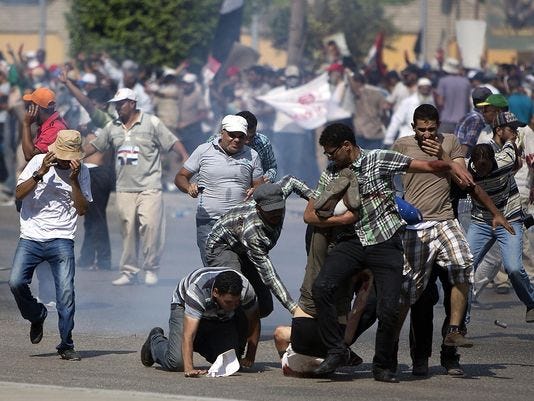
Supporters of ousted Egyptian president Mohammed Morsi rush to help a wounded man after a gunbattle erupted outside the Cairo headquarters of the Republican Guard on Friday.(Photo: Mahmud Hamsud, AFP/Getty Images)
Story Highlights
- Muslim Brotherhood calls for peaceful demonstrations
- No date has yet been set for new elections
- Islamists view Morsi's ouster as attempt to thwart democracy
CAIRO — At least 30 people were killed Friday in Egypt as gunfire and running battles erupted at several cities during a day of protests called by Islamists angered by the military ouster of President Mohammed Morsi.
At least 12 deaths were reported in clashes In Alexandria, the country's second largest city, after Islamists opened fire on a rally of Morsi opponents, a medical services official told the Associated Press. Police in the Mediterranean coastal city sided with Morsi protesters.
In Cairo, the bloodiest confrontation came as troops opened fire on protesters outside the Republican Guards military barracks where the ousted president is being held. A Health Ministry official told the Associated Press that four people were killed.
Hundreds of demonstrators had marched to the site following afternoon prayers, chanting, "After sunset, President Morsi will be back in the palace."
Morsi, the country's first democratically elected president, was removed from office two days ago by the military, which also ordered the suspension of the constitution and parliament.
At nightfall, a crowd of Islamists surged across the October 6 Bridge over the Nile River and clashed with Morsi opponents near Tahrir Square and outside the state TV building. One witness reported gunfire and stone-throwing, and one person was killed, said Khaled el-Khatib, of the Health Ministry.
Late Friday, military armored vehicles arrived on the bridge and outside the TV station to stop the fighting, and Morsi supporters retreated.
Adham AbdelSalam, an Egyptian television and radio presenter, tweeted reports and photos from Tahrir Square showing injured civilians and a bullet casing in his hand.
"At #tahrir now... sounds of machine / automatic gun fire from pro #morsi supporters shot at protesters now," AbdelSalam tweeted. "Live from #tahrir... one more dead... by pro #morsi bullets."
As central Cairo descended into chaos Friday night, the country appeared to severely lack leadership as security forces failed to protect citizens.
Neither police nor military intervened in clashes that broke out along the Nile, while security remained largely absent on streets across the capital, except in strategic locations.
Helicopters flew over the capital as anti-Morsi demonstrators rallied in Tahrir Square, which is not far from where clashes broke out and is several miles away from Nasr City, where Morsi supporters gathered.
Clashes, some involving police, erupted in cities of southern Egypt, along the Suez Canal and in the Nile Delta as Morsi supporters marched on local government buildings.
Four others died in the northern Sinai city of el-Arish, where Islamists stormed the main government building, and one was killed in the southern city of Assiut.
Late Friday, Egyptian authorities denied an earlier report by state television that curfews had been imposed in the North Sinai towns of Sheikh Zuweid and Rafah, which are on the border with Israel and the Gaza Strip.
In Cairo, there were conflicting reports regarding the shooting outside the Republican Guards barracks. Journalists with several news organizations reported seeing Egyptian troops open fire on the crowd, while Reuters quoted a military spokesman as saying the army fired only blank rounds and tear gas at the protesters, not live ammunition.
BBC reporter Jeremy Boven, who was hit above the ear by shotgun pellets, said he saw the soldiers fire on the protesters.
Gehad El-Haddad, the spokesman for Muslim Brotherhood, said it was military police nearby — not the Republican Guards — who opened fire. He said on a Twitter post that he did not know whether the shots were fired "under panic or by order."
The protests, called by Islamists as a "Friday of Rejection," broke out in several locations in the city, including Cairo University and in front of state TV, as well as on the October 6 bridge.
In the midst of the violence, parliament was formally dissolved by interim President Adly Mansour, who was appointed by the military.
&a mp;amp;amp;amp;amp;amp;amp;amp;amp;amp;lt;!--iframe--&a mp;amp;amp;amp;amp;amp;amp;amp;amp;amp;gt;
The gunfire at the barracks broke out as marchers approached a barbed wire barrier and one supporter hung a pro-Morsi sign.
Troops standing guard tore down the sign and warned the crowd to stay back. A protester then hung a second sign and the soldiers opened fire on the crowd, according to an AP photographer at the scene.
Several protesters fell bloodied to the ground. At least person one had a gaping, bleeding exit wound in the back of his head.
Fellow protesters carried the body into a nearby building and covered his head with a blanket, declaring him dead, according to AP Television News footage.
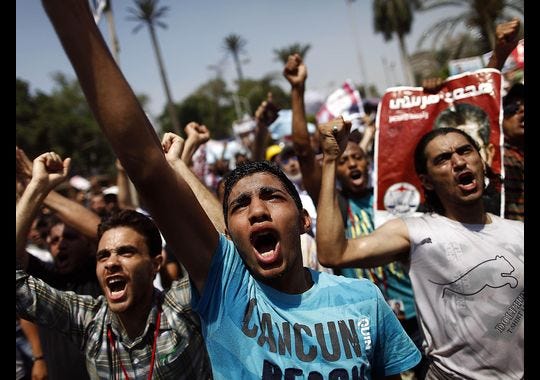 Egyptian supporters of the Muslim Brotherhood and ousted president Mohammed Morsi shout religious and political slogans during a protest near Cairo University in the Egyptian capital on Friday.(Photo: Mahmud Khaled, AFP/Getty Images)
Egyptian supporters of the Muslim Brotherhood and ousted president Mohammed Morsi shout religious and political slogans during a protest near Cairo University in the Egyptian capital on Friday.(Photo: Mahmud Khaled, AFP/Getty Images)
Protesters pelted the line of troops with stones, and the soldiers responded with volleys of tear gas.
Here's how the BBC reported the incident:About 2,000 people had marched on the officers's club after passionate Friday Prayers at the nearby Rabaa al-Adawiya Mosque. As the crowd grew, got angrier and pushed forward, the troops opened fire — first into the air, then at the crowd, our correspondent reports. He saw one man fall to the ground with blood on his clothes. More people are arriving at the scene and anger there is growing, he adds.The military, which ousted Morsi, had warned protesters against violent demonstrations.
The National Alliance in Support of Electoral Legitimacy said it "feels rising public anger and the imminent danger threatening the nation as a result of the unprecedented military coup d'état against legitimacy derived from the will of the people and the January 25 Revolution."
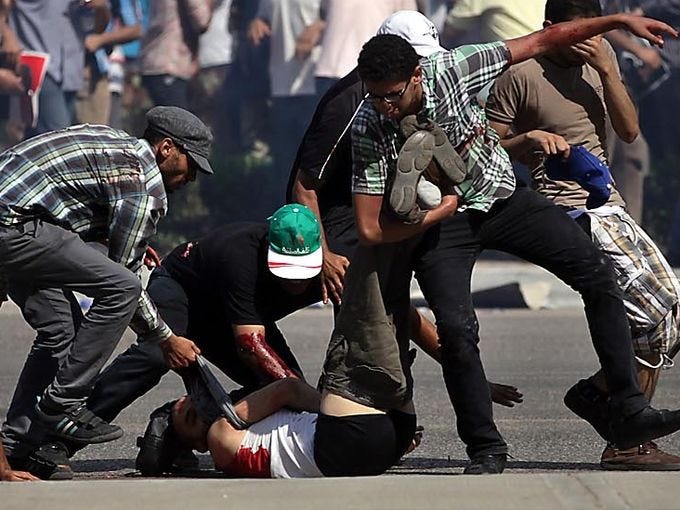 Supporters of ousted Egyptian President Mohammed Morsi rush a wounded man away from the scene of a shooting outside the Egyptian army's Republican Guard headquarters on July 5 in Cairo. At least three Morsi supporters were killed. Khalil Hamra, AP
Supporters of ousted Egyptian President Mohammed Morsi rush a wounded man away from the scene of a shooting outside the Egyptian army's Republican Guard headquarters on July 5 in Cairo. At least three Morsi supporters were killed. Khalil Hamra, AP
Fullscreen
In a statement, the alliance said "it affirmed its full and categorical rejection of the military coup — against the President, the Constitution and democratic legitimacy — and all consequent actions and effects."
Mohammed Badie, the supreme leader of the Muslim Brotherhood, spoke at a rally near the Rabaa al-Adawiya Mosque in Cairo, and denied reports that he had been arrested. He also said demonstrators were determined to oppose the military's actions.
"We shall stay in the squares until we bring President Morsi back to power," he told a cheering crowd.
In Nasr City in Cairo, Essam ElErian, deputy chairman of the Freedom and Justice Party, which Morsi once headed, told a rally that "all of Egypt says 'no' to military coup," Al Jazeera reported.
"The honor of the military forces has been violated by the coup," he said. "What kind of reconciliation can take place after people's voice has been neglected? We will not accept such coup on elected government. We will not cooperate with such rule."
In Cairo, Abdullah Alfkaharany, 23-year-old medical school graduate and Muslim Brotherhood sympathizer who was in the streets, said opponents of Morsi should have waited until his term was up, not remove him by force.
"The people in the street did not win the election. They take and they blackmail and they fight to make some sort of military coup." he said.
Still, he suggested that most Egyptians simply want peace.
"We have 20 million people, and most of them just want peace," he told USA TODAY. "But there are people on both sides. I have friends who hate the Brotherhood and they are standing in front of tanks, and then others like me who are against the coup."
The military leaders who brought down Morsi on Wednesday also ordered the nation's parliament to be dissolved, suspended the constitution and installed Mansour, head of the country's High Constitutional Court, as the interim president until new elections are called.
Many at Friday's Islamist rally – several miles from Tahrir Square – said the problem isn't just that Morsi was pushed from power. They are angry that all of their votes over the past two years are now washed away with the military's recent decisions.
"It's not about the Muslim Brotherhood, and Morsi," said Mohammad El Taher, 34, a civil engineer. "It's about my vote."
"They are destroying democracy," he said.
As the country braced for the protests, the military had warned protesters against any violence. The first major attack by militants, in Sinai, raised fears that the Islamists' extreme fringe will turn to violent retaliation for the toppling of Morsi.
Early Friday, masked gunmen used rockets, rocket-propelled grenades and anti-aircraft guns to attack the airport in el-Arish, the provincial capital of northern Sinai, as well as a security forces camp in Rafah on the border with Gaza and five other military and police posts. At least one soldier was killed in nearly four hours of clashes that ensued.
EGYPT: Egypt presents 'paradoxical situation'
Some fear violence may escalate in the coming days, and there are threats of Islamist retaliation, but organizers of Friday's pro-Morsi rallies called for peaceful mobilization.
Nonetheless, Morsi's supporters were prepared for clashes: Men guarded the borders of the protest wearing helmets and carrying sticks while volunteers searched those entered.
"I want the peaceful road," said banker Hossam Abdel Gowab, 45, holding an orange prayer mat. "I came here to protect my voice. … We wanted a democracy through the ballot box."
Islamist protesters insisted Morsi has constitutional legitimacy because he was democratically elected in what was considered the country's first free and fair election. They were furious over what they see view as a blatant attempt by the military to thwart democracy.
Hard-line Islamist presidential candidate Hazem Salah Abu Ismail was arrested at his home Friday and accused of inciting violence, Reuters reported, citing security sources.
The political turmoil has sparked pockets of violence nationwide over the past week, killing around 50. Clashes erupted again on Thursday between Morsi's opponents and supporters, this time in Morsi's hometown, Zagazig, which is located in the Nile Delta region. Dozens were injured.
Reports also said gunmen on Thursday attacked several police and military outposts in Egypt's Sinai Peninsula — a massive chunk of land that borders Israel and the Gaza Strip. Egypt's army announced a state of emergency in the area Friday, state TV reported.
Some fear violence may escalate in the coming days, and there are threats of Islamist retaliation. But organizers of Friday's pro-Morsi rallies are calling for peaceful mobilization.
Islamists are furious over what they view as a blatant attempt to thwart democracy. They say Morsi has constitutional legitimacy because he was democratically elected in what was considered the country's first free and fair election.
At the Cairo mosque where Morsi supporters have gathered for nearly a week, the mood was subdued on Thursday. Protesters said they won't budge until Morsi comes back. Many are angry at what they view as international support for a military coup, particularly from the United States.
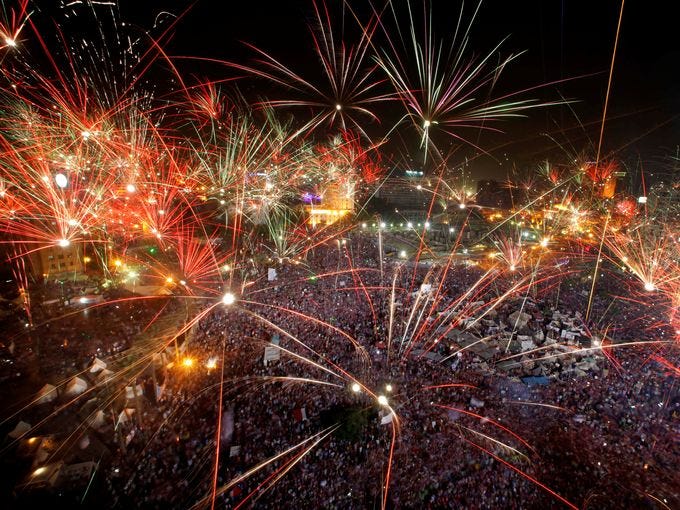 Fireworks light up the sky as opponents of Egypt's ousted president, Mohammed Morsi, celebrate in Tahrir Square on July 3 in Cairo. Amr Nabil, AP
Fireworks light up the sky as opponents of Egypt's ousted president, Mohammed Morsi, celebrate in Tahrir Square on July 3 in Cairo. Amr Nabil, AP
Fullscreen
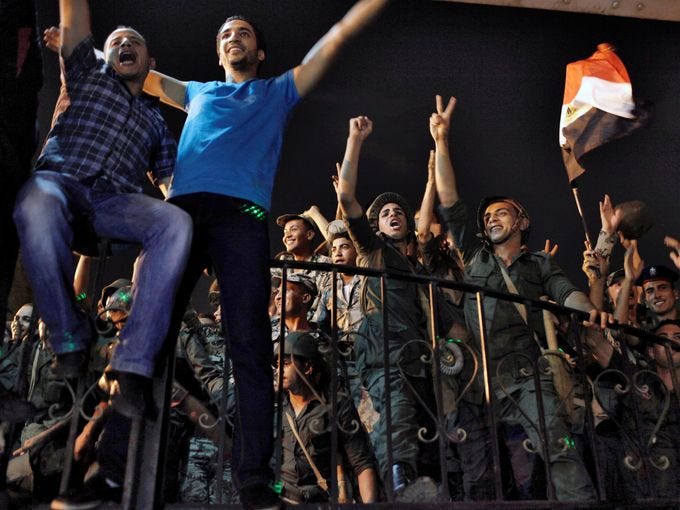 Protesters and the Egyptian Republican Guard celebrate at the gates of the guard headquarters after a broadcast confirming that the military will temporarily be taking over from the country's first democratically elected president, Mohammed Morsi, on July 3 in Cairo. Ed Giles, Getty Images
Protesters and the Egyptian Republican Guard celebrate at the gates of the guard headquarters after a broadcast confirming that the military will temporarily be taking over from the country's first democratically elected president, Mohammed Morsi, on July 3 in Cairo. Ed Giles, Getty Images
Fullscreen
"America supported the coup," said Hani Abu Nasser, an Arabic teacher at an institute associated with Al-Azhar, a leading academic and Islamic establishment. He said he thinks the U.S. is supporting Hosni Mubarak's "discriminatory" regime to try to keep political Islam from succeeding.
Muslim Brotherhood figures have been rounded up and arrested over the past few days and some are barred from leaving the country, further infuriating Islamists.
There is also concern among human rights groups over the effects of such rights abuses.
"A return to Mubarak-era practices of mass arrests and politically motivated imprisonment of Muslim Brotherhood leaders will have the worst possible effect on Egypt's political future," Human Rights Watch said.
"Egypt's new interim president and the military leadership should immediately end reprisals against Muslim Brotherhood political leaders, including arrests or travel bans, and should allow the Freedom and Justice Party to fully exercise freedom of association, the rights group said.
Several Islamist television channels have also been cut, violating expression freedoms.
Maha Maamoun, a human rights activist, said there is concern that rights violations could escalate in the weeks ahead as the army implements steps in the transitional period.
In a separate move Friday, the African Union suspended Egypt's membership on the grounds of an unconstitutional change in government.
While Egypt was ruled by a group of generals after Hosni Mubarak was ousted in 2011, the nation witnessed a spike in the number of military trials for civilians. In military courts, judges are military officers and basic due process rights are not respected, rights groups say. Soldiers also killed protesters, repeatedly broke up demonstrations using force and committed other human rights crimes.
"We are worried about the military," Maamoun said, noting that even under Morsi military trials for civilians have continued.
Still, many have cheered the military's role in facilitating Morsi's ouster, celebrating again Thursday night in Tahrir Square. Morsi's opponents don't view his overthrow as a coup, but rather a second — or continuing — revolution in which the army acted on the will of the people.
"It's going to be a transitional phase and (the military) will not rule," said Amir Dous, who protested against Morsi in the square this week. "They are here to make it easier for the transition to a democratic country."
"That's what I believe," he said.
http://www.usatoday.com/story/news/world/2013/07/05/egypt-morsi-rally/2491035/NO AMNESTY
Don't reward the criminal actions of millions of illegal aliens by giving them citizenship.
Sign in and post comments here.
Please support our fight against illegal immigration by joining ALIPAC's email alerts here https://eepurl.com/cktGTn


 LinkBack URL
LinkBack URL About LinkBacks
About LinkBacks




 Reply With Quote
Reply With Quote


Illegal immigration is costing American hospitals billions of...
04-27-2024, 07:55 PM in General Discussion